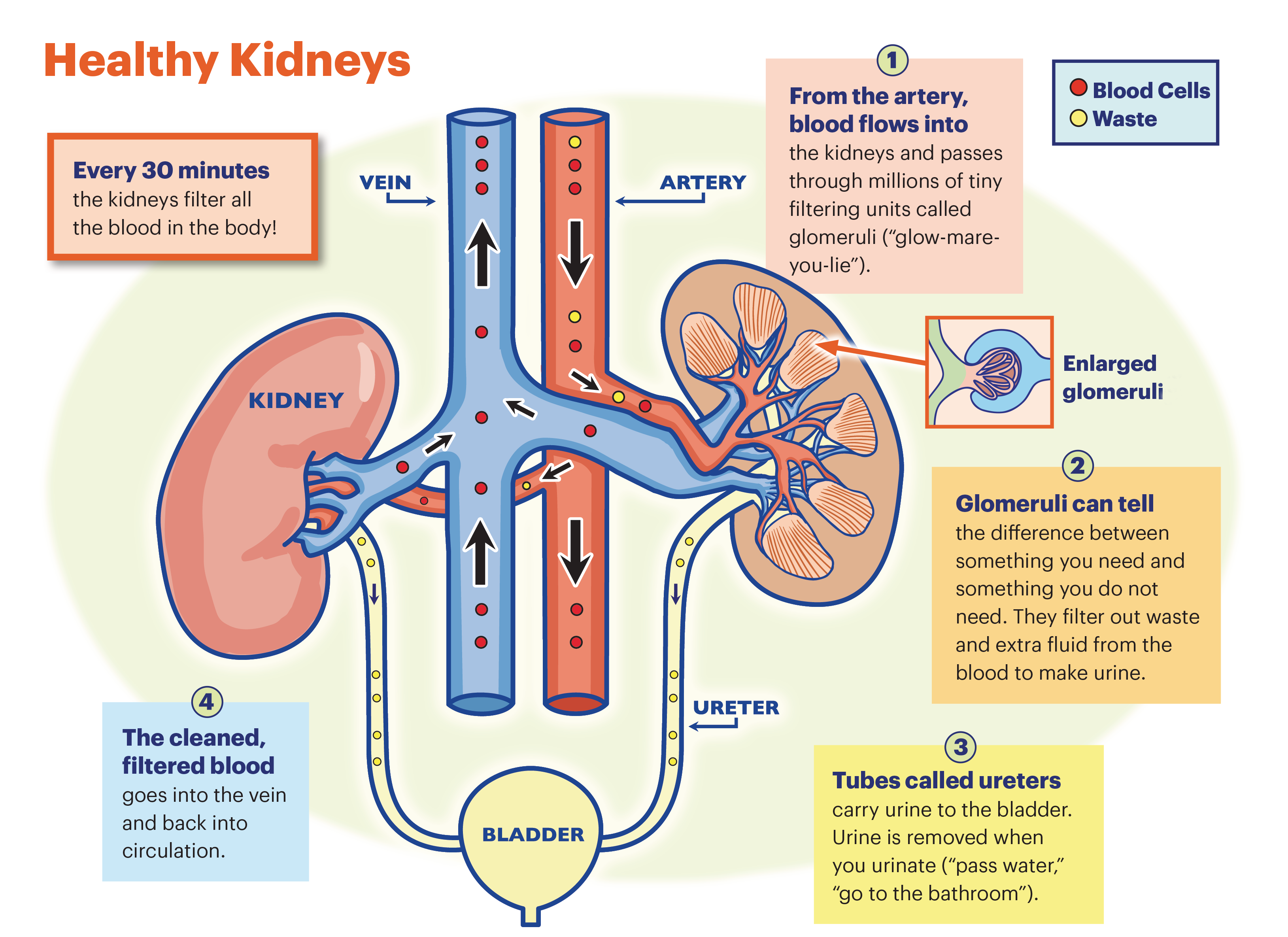Last updated: October 15, 2024
Medically reviewed by: NKF Patient Education Team
The kidneys perform important functions that keep the body in balance, such as filtering blood, regulating blood pressure, and removing waste. Simple lab tests can check kidney function to help find problems early.
About kidney function
Most people are born with two kidneys, each about the size of an adult fist, on either side of the spine just below the rib cage. Although small, your kidneys perform many complex and vital functions that keep the rest of the body in balance. For example, kidneys:
- Help remove waste and excess fluid from your body
- Filter the blood, keeping some compounds while removing others
- Help make red blood cells
- Balance important vitamins and minerals
- Help maintain your blood pressure
- Keep bones healthy
Kidney filtering process
Your kidneys are on either side of your spine, just below your rib cage. Inside each kidney are up to a million tiny parts called nephrons that help filter (clean) your blood. Once the kidneys filter the blood, the cleaned blood is sent back into the body, and the waste materials, now in the form of urine (pee), are moved into the bladder. The following is the filtering process for healthy kidneys – step-by-step:

- Blood enters the kidneys through an artery from the heart
- Blood is cleaned by passing through millions of tiny blood filters
- Waste material passes through the ureter and is stored in the bladder as urine
- Newly cleaned blood returns to the bloodstream through veins
- When the bladder is full, urine leaves the body through the urethra
Did you know?
Your kidneys filter about 200 quarts of fluid from your blood each day! Most of it is cleaned and returned to your body, while about 2 quarts turn into pee, stored in the bladder until you need to go to the bathroom.
Kidney function testing
Two simple tests can check how well your kidneys are functioning. The first is a blood test called estimated glomerular filtration rate (eGFR) and the second is a urine test known as the urine albumin-creatinine ratio (uACR). Both tests are needed to have a clear picture of your kidney health.
- Albumin to creatinine ratio (ACR) measures the albumin (a kind of protein) in your pee. Having too much albumin may mean your kidney’s filtering units have been damaged by disease. One positive result could be due to fever or heavy exercise, so your doctor will want to confirm your test over 3 months.
- Estimated glomerular rate (eGFR) is a blood test measuring creatinine (a waste product from the digestion of dietary protein and the normal breakdown of muscle tissue) from which kidney function levels can be estimated. Aside from having kidney disease, creatinine levels can be affected by other factors, including diet, muscle (weight of your muscles), pregnancy, malnutrition, chronic illnesses, and more.
Regularly checking your kidney function is a good idea since, with early detection and treatment, it can stop or slow down the progression of kidney disease.
Questions to ask your healthcare provider
- How can I keep my kidneys healthy?
Understanding preventative measures is important for keeping kidneys functioning well. - What do my kidney test results (eGFR and uACR) mean?
Understanding your personal test results can help you to make decisions about your kidney health. - What steps can I take if my kidney function is declining?
Early detection and treatment can slow the progression of kidney disease, so it’s helpful to know what actions to take. - How often should I get my kidney function tested?
Since kidney disease may not have any clear signs until the disease is advanced, regular testing (ie, usually once per year for people with no known risk factors and/or symptoms of kidney disease) can find kidney function changes early.
Resources
To find more resources like this and in several languages go to Patient Education Library: 2-sided Flyers



















